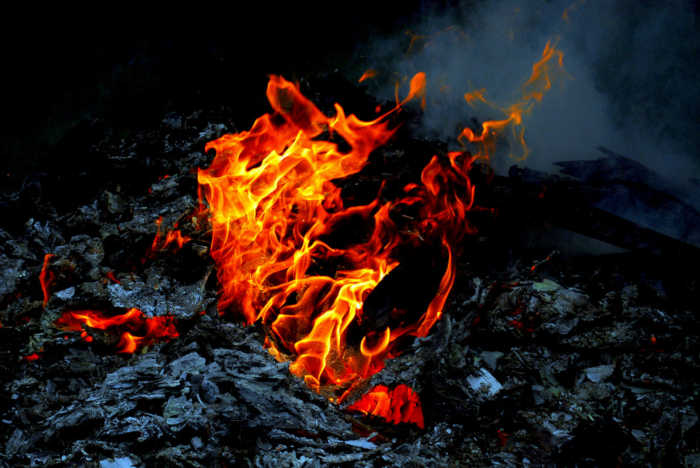FWP:
SETS == IZAFAT
MADNESS: {14,3}
For background see S. R. Faruqi's choices. This verse is NOT one of his choices; I thought it was interesting and have added it myself. For more on Ghalib's unpublished verses, see the discussion in {4,8x}.
What is 'the thought of smoke'? Thanks to the fruitful ambiguity of the iẓāfat , it can be a thought that is in the mind of smoke, or a thought about smoke (in someone else's mind), or a thought that itself 'is' (is made of?) smoke, or a thought that belongs to smoke, or is related to smoke in some other, unspecified way. On these ambiguities see {41,6}.
The verse is basically an interactive play of metaphors. Fire is condemned by its very nature to perpetual 'ash-sitting', a sign of sorrow, humility, or renunciation. This lowness saves it from the frothing-up ('head-ebullience') of the madness of misconception' represented by 'the thought of smoke'. Whatever the 'thought of smoke' might be, it's clear that it is something that rises high, something on the ascendant-- and thus an image of arrogance or 'high-headedness' ( sar-kashī , 'drawing up the head', is a traditional sign of arrogance).
Such arrogance would presumably be a form of the 'madness of misconception'-- and, as so often, it's left up to us to decide what that mad misconception or misunderstanding might be. No doubt it would involve smoke-- smoke that rises so high (might it not reach up to the heavens?), smoke that is so thick and dense (might it not come to pervade the atmosphere?), smoke that contains the 'heat' and turmoil and passion of the fire (might it not therefore have some mystical efficacy?).
All such delusions of grandeur are kept in check by the 'vexation' or 'affliction'-- literally, the 'dust' (see the definition above) of 'ash-sitting'. Dust resembles smoke; but here, dust keeps smoke in check. Dust and smoke balance each other out. Fire is crowned by 'the thought of smoke', but it's also grounded in 'ash-sitting'. For a more complex, more deeply Ghalibian use of ḳhākistar-nishīnī , see {15,11}.
Note for grammar fans: In the first line, thā seems to be used in place of hotā , the contrafactual that would accord with the grammar of the second line. For another, similar kind of colloquial usage (the perfect for the subjunctive), see {35,9}.

Asi:
From the thought of smoke, the head of my madness of misconception would spin around, and in it a kind of ebullience would be created-- if somehow the thought of the dust of ash-sitting were not present. That is, in my misconception various kinds of thoughts would have been created by its smoke, but fortunately in fire, because of its ash-sitting, the substance of dust is also present, which is not present in lovers and people of that kind. Thus now there is no misunderstanding on its part.
== Asi, p. 136